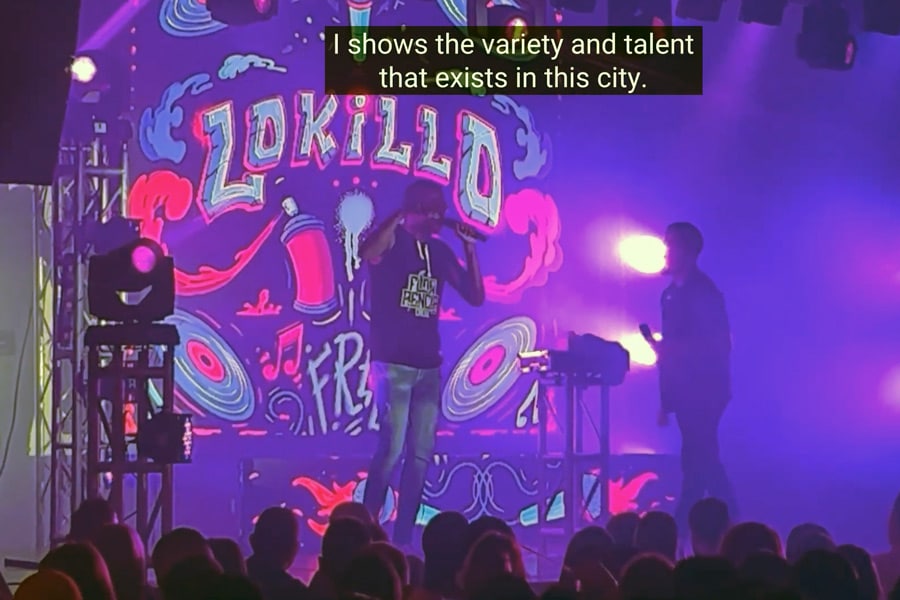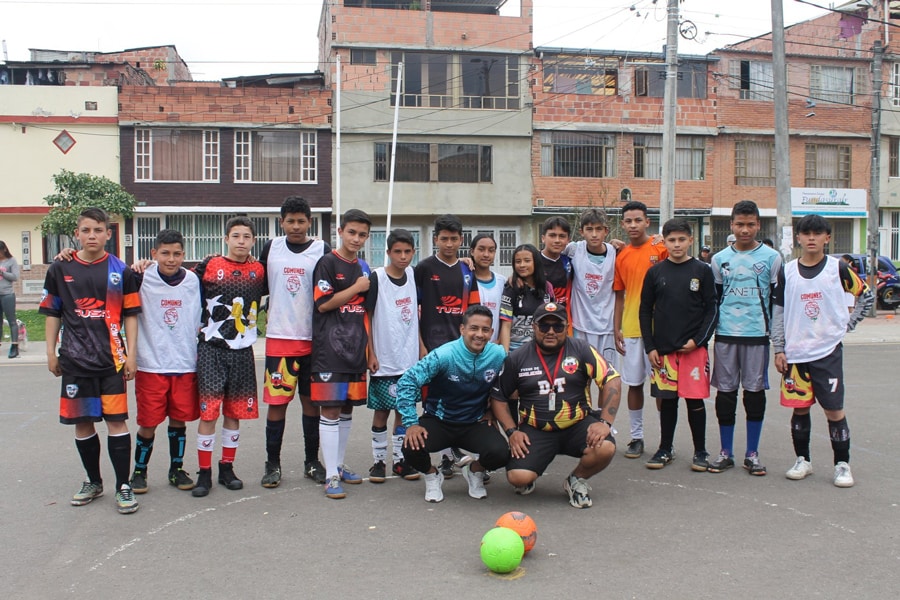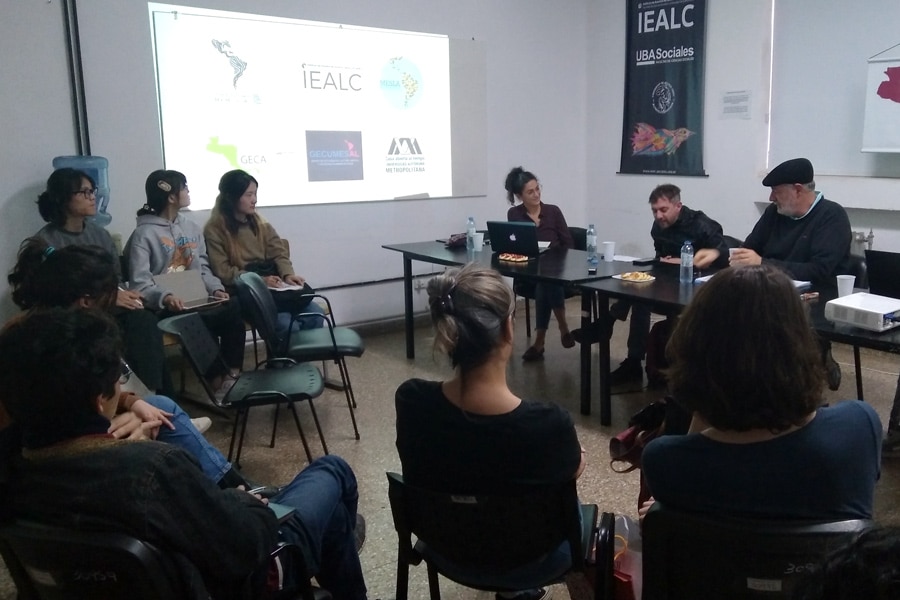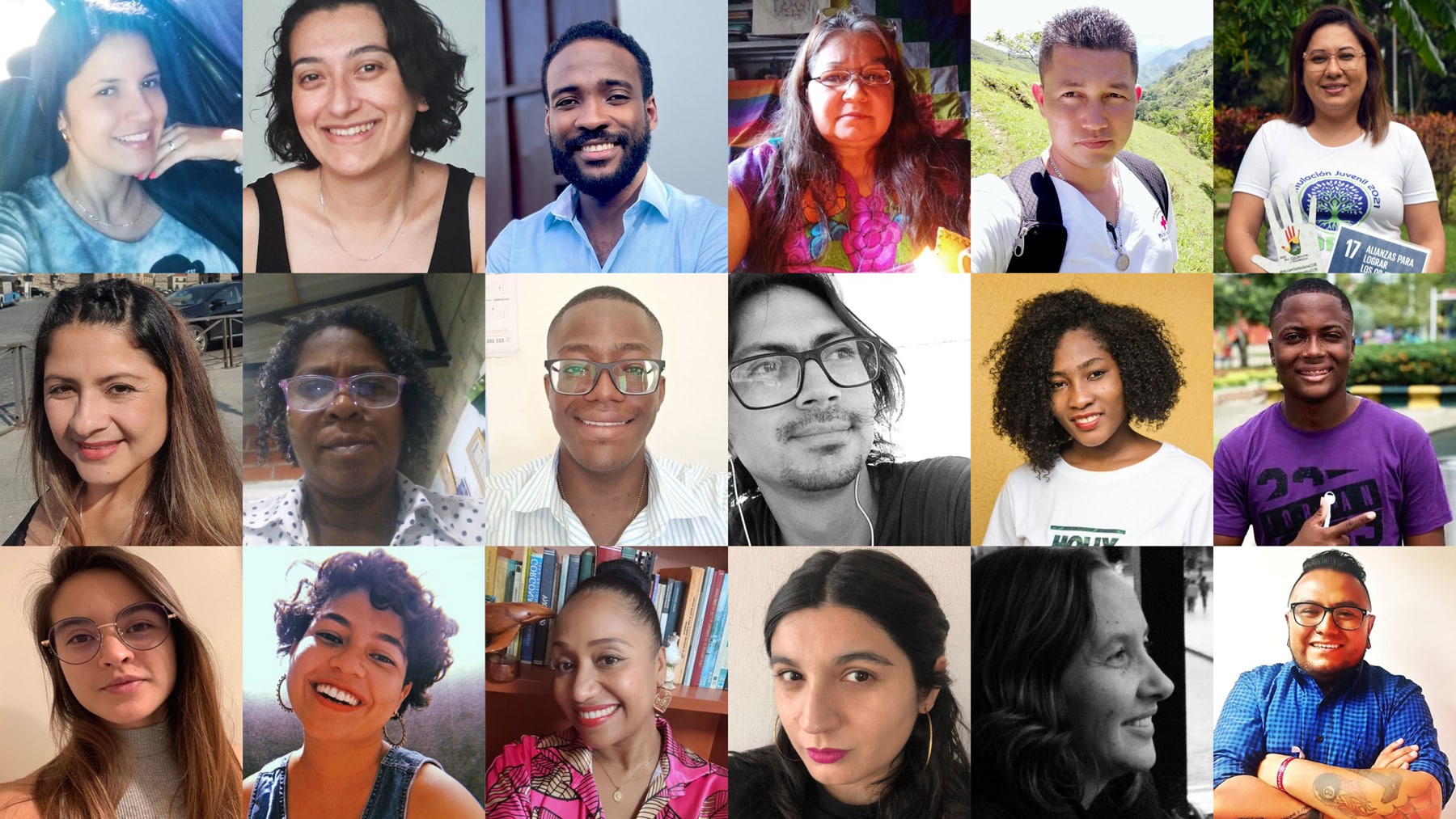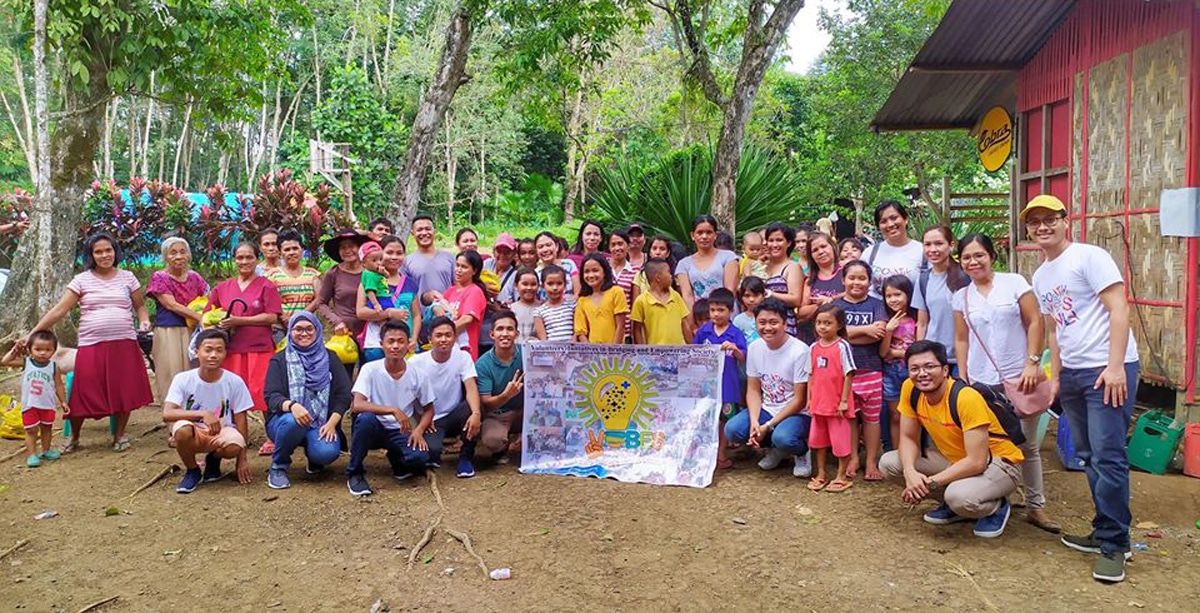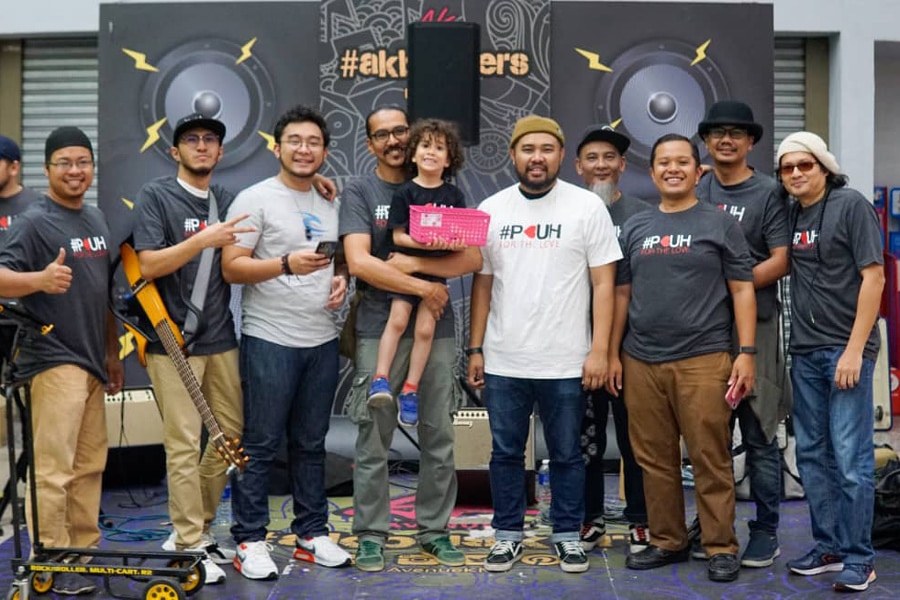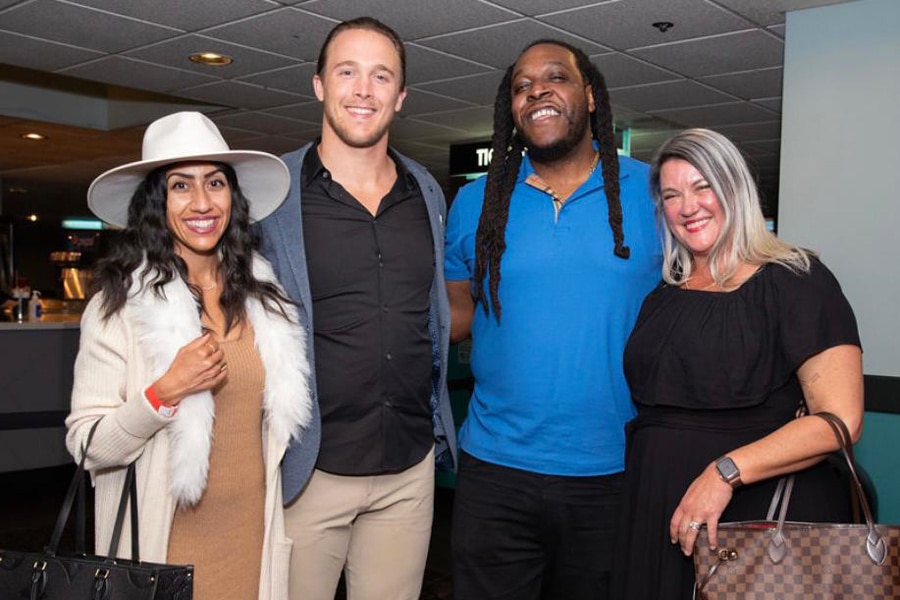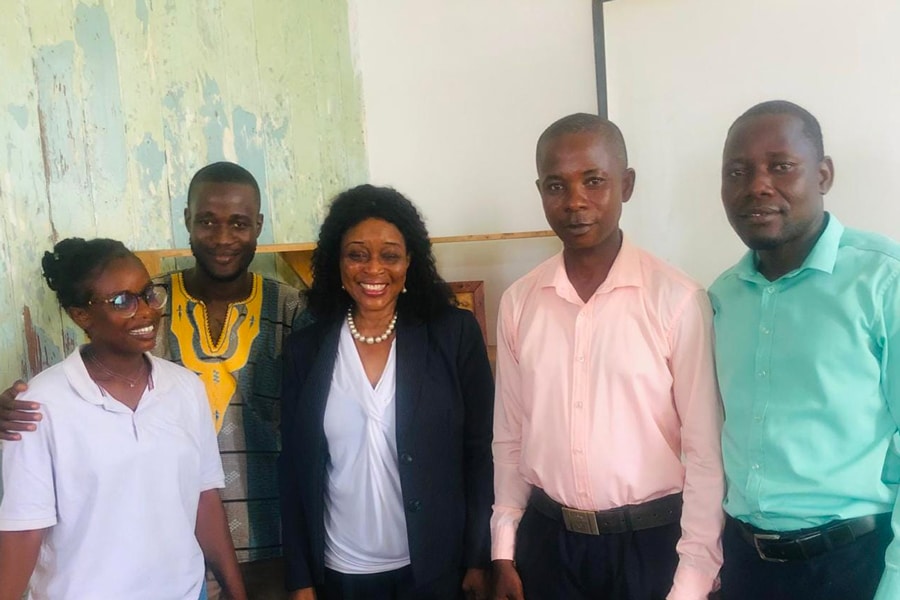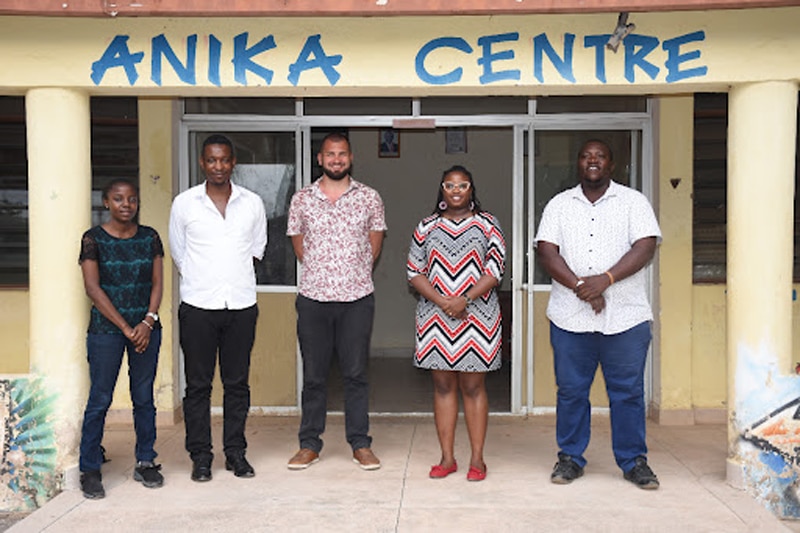Freestyling for Change: inspiring youth in Caqueta, Colombia
By Lissette Mateus Roa, Facilitator, Goldin Global Fellows
We want to share the unique and inspiring journey of twenty-four year old Johnatan Cordoba from Florencia in the Caqueta region of Colombia. Johnathan is a 2022 Global Fellow (Spanish Edition). He is a trained attorney who combines his skills with the arts to support youth development and youth leadership through Flowrencia Crew (@flowrenciacrew).

What we particularly want to share is how the month of August transpired for him. Employment opportunities in Colombia, particularly for young attorneys, are not always easy to obtain. Johnathan managed to secure himself a position as a Municipal Police inspector, in the Municipality of Solita Caqueta, a small town in the south of Colombia. This region has endured armed conflict for the past 14 years, which makes Johnathan’s new position both rewarding and challenging however he is determined to be a role model for other young people.
“The activities that we provide in our community work are opportunities in which young people can be themselves and can express their vision of reality and their perceptions of it. Likewise, we work to generate sharing times to use free time in a good way, encouraging young people with trips and prizes such as: clothing or accessories. In our space we also seek to promote local talent through music, perhaps one day we will have a super star among us. Additionally, we also work with beatbox and at this moment from our territory we have the national champion in that discipline, which is why we are motivated to work with art and hope with it to provide tools for change and opportunities for personal improvement with them. Finally, I highlight the importance of freestyle and beatbox, to release repressed emotions, traumas, stress, and other negative situations that young people acquire from the environment, we work to create safe spaces and an escape door”.

Indeed, alongside his role as an attorney and police inspector, Johnathan believes that music and rapping/freestyling has significant potential for social change among youth. Johnathan’s freestyling recently landed him a great opportunity with a very famous Colombian comedian Lokillo (@lokilloflorez, who has a following of over 3 million people), who is doing a freestyle tour in the country. Johnathan was invited to participate in one of Lokillo’s shows in Florencia, Caquetá. Now, Johnathan’s area of residence (Solita) is not just quite a distance from where the show was being held (Florencia) but the terrain and route is not the most easy. He describes the journey as “going through a marathon” to be able to get to the show in time. Below you can see the journey he undertook followed by his performance on stage with Lokillo.
“It was important to share this stage with Lokillo because he recognized the work done, gave us visibility and he trusted that my talent would impact the audience (over 500 people) who had paid for the show. It was also very important to be able to get in touch with someone who is so relevant in Colombia, who listened to our work and who used his position to make us visible. It was so important that he has been kind enough to help us organize one larger event in our territory which will take place on October 29, in Florencia, Caquetá. His help consisted of motivating the young people in the community and providing us with supplies for the event. It should be noted that for these events we are also using the contributions made by Goldin Institute through 2022 Goldin Global Fellows in Spanish Language. In addition, it is necessary to state that the freestyle events we hold are important to transform my community; Caquetá is an area marked by internal armed conflict, so tools are required that achieve sensitivity in the community. Working with young people is vital, as it gives them a platform to use their free time while keeping them away from violence and other unfavorable environments”.
Unity, Peace and Reconciliation Through Soccer
By Omar Arturo Diaz, Goldin Global Fellow, Colombia
The “Peace and Unity festival” was initiated to use football as a fundamental element to hatch social ties, where different ways of thinking meet to look for new ways of reconciliation, social peace, and unity, so Colombia becomes the country we dream of. This year, we wanted to go further so we included some new activities, including discussion spaces, walking tours through our neighborhood, and of course our traditional “picadito” (local football matches between friends frequently played on non-professional courts). As a dissident family, we appreciate that popular football, peace, and unity need a conscious commitment from players, families, trainers, neighbors, and others who understand territory and sport as political and transforming ventures.

Keeping that in mind, in the last three years we have been developing the festival with the participation of different football, social, and political organizations. Doing so, we have built together a practical space where ideas, actions, and dreams are worked around the ball, encouraging peace and unity.

On 16th August 2022, the festival started with a forum where people gathered into activities, reflections, and ideas around popular football in Bogotá city. As a result, a regional link was built as well as the fostering of relations between participants, through dialogues and the stabilization of a common discourse. We were eager to keep creating dreams and envision a country where everybody can help without being condemned or stigmatized. Once there, we had the company of “Jaguar Rojo” and “Bukaneros”, two football schools that are already known in house.
Together, we looked forward to sharing ideas for what is going to be a new book, the name of which will be “Popular football: stories, actions, and reflections” to be published by our label “Imprenta rebelde”.

For the second day, we knew a lot about the soil situation in Ecuador from an interview broadcasted on “Ecos de Rumiñahui” radio station (fb.watch/fcQ9Ry0Jcy/). We took the opportunity to speak about former festivals as well and expand the discussion around football and its importance to build peace, especially in popular Colombian territories.
On the third day a group of female football players attended the forum, sharing from their title “Rebel football female players: between soccer and the academy”, where they explored the importance of women in popular football, especially against the idea that football is often considered as a masculine expression. These ‘rebel football women’ will also participate with their stories in our already mentioned soon-to-be launched book.

On the 4th day, we launched the first book through our self-management process created at our popular football school “La pelota rebelde”: “La pelota rebelde” publishers. Among other things, the book deals with the experiences of political prisoner and peacebuilder Jaison Murillo. The ceremony was made at the Bogotanian football temple El campín, and its public sports library. There, we had the participation of different points of view and experiences around prison, from people who want to transform the establishment.

The last day was covered by the main characters of our school: children, parents, grandparents, and all family – the rebel family. We enjoyed a kite festival where we tried to build consciousness about the territory around the Bogota River, highlighting that sports can also expose and remedy other issues that impact our town. This beautiful event ended with our traditional “Picadito por la paz y la unidad” (soccer match for peace and unity). We had 16 hours of consecutive football, which meant 17 matches. We also had some cultural events, where musical bands and artistic groups met at a local town court to declare peace and unity as fundamental to building the Colombian nation, the one we all dream of.
Social Movements and State Violence
By Diana Rocio Gomez Torres, 2022 Goldin Global Fellow, Argentina
Last Thursday, August 25, we held the discussion “Social Movements and State Violence: past and present” organized by Trenzar Memorias, Memory and Culture Network in Latin America and the Caribbean. The discussion took place at the Institute for Latin American and Caribbean Studies (IEALC), attached to the University of Buenos Aires in Argentina. We set ourselves two objectives: first, to discuss the role played by the indigenous movements of the Andean region of Latin America and to evaluate the repression that the State carried out against the Guatemalan indigenous people during the 1980s. Second, to discuss the social mobilizations that have taken place in Chile and Colombia between 2019 and 2021, as well as evaluating the place of the State and its response to these mobilizations.
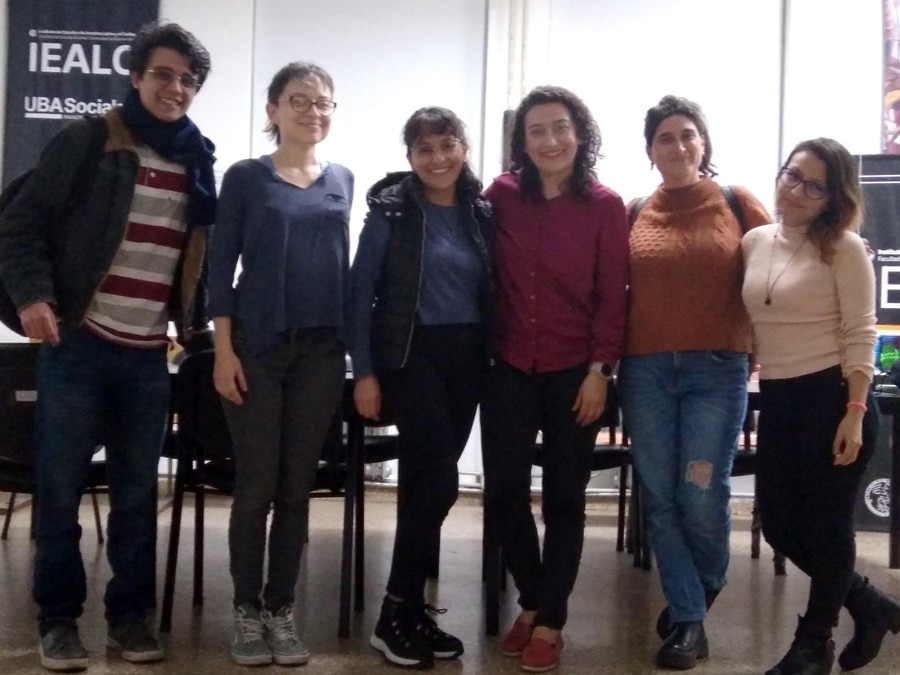
The discussion 'Social Movements and State Violence: Past and Present' is of interest to the academic community and to Latin American society in general because it allows us to reflect on the reconstruction of our recent past and find democratic solutions to the social crises of our present. -- Diana Rocio Gomez Torres, 2022 Goldin Global Fellow, Argentina
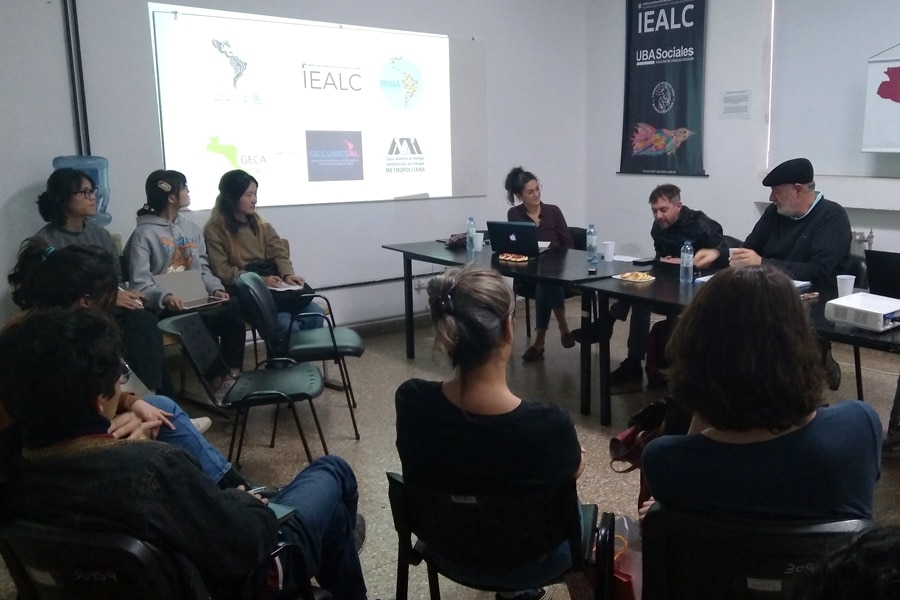
As Trenzar Memorias, we wanted to discuss the emergence of social movements in different countries of the region and the political changes that have been generated in recent years. We believe that reflection and visibility of the history and memory of these social movements are necessary, as well as the strategies of symbolic resistance that are facilitated by our cultures.
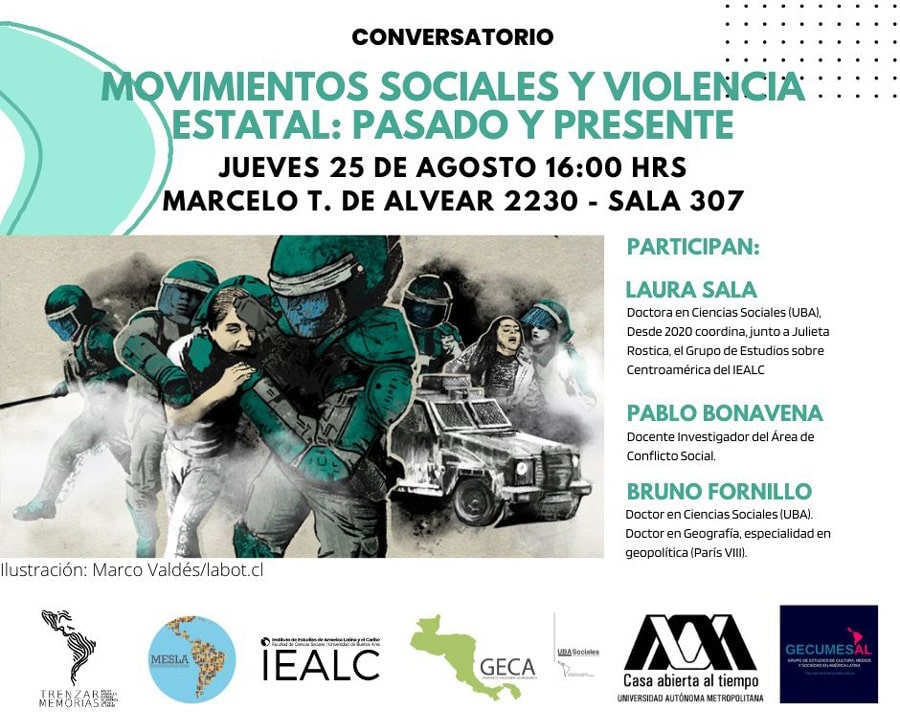
In the discussion we had the participation of three scholars who have researched the characteristics of social movements and State violence against civilian populations. Dr. Laura Sala spoke to us about the role of the State in the Guatemalan genocide. Dr. Pablo Bonavena established the relationships between the State and Social Movements throughout the history of the 20th century in Latin America. And finally, Dr. Bruno Fornillo spoke about the Indigenous movements of Ecuador, Mexico and Bolivia. and their actions during the 20th and 21st centuries.
One of the conclusions of the conversation is focused on characterizing the relations between the State and social movements, which can be understood using ‘Pacification theory’, which guides the actions of the State and also accounts for the limits of its domination when a revolt or social outburst arises. It is through this ‘pacification’ that the State builds mechanisms of domination over citizens to make social injustice tolerable. In this way, when social movements arise that claim new demands or the expansion of social or economic rights, that ‘pacification’ is called into question; and so the State's response is violent and repressive. That is to say, the emergence of social movements shows a crisis between the domination of the State and an intolerance for social injustice that until that point was allowed. Hence, the need to silence those dissenting voices of the leaders of social movements by the State, or the need to sit down and discuss the construction of a new margin of tolerance of social injustice with these actors.
To hold the event, we had the institutional support of various academic entities such as the Autonomous Metropolitan University of Mexico, the master’s degree in Social Studies in Latin America (MESLA), the Study Group on Culture and Media in Latin America (GECUMESAL), the Institute of Studies on Latin America and the Caribbean (IEALC), the Group of Studies on Central America; the latter four belonging to the University of Buenos Aires in Argentina.
The discussion is related to the dossier proposed for our third magazine Trenzar Memorias, which bears the same title "Social movements and state violence: past and present." In the following link you can find more information about the Network https://trenzarmemorias.org/
Meet the 2022 Goldin Global Fellows (Spanish Language Cohort)
By Lissette Mateus Roa, Co-Facilitator, Goldin Global Fellows
The Goldin Institute is proud to introduce the inaugural Goldin Global Fellows (Spanish Language Edition)! We invite you to learn about each of the outstanding Goldin Global Fellows who live and work in Argentina, Bolivia, Chile, Colombia, Haiti, Mexico, Spain, the United States and Venezuela. This diverse group of fellows will learn and work together as a Community of Practice, building on the talents of their neighbors and the assets of their communities to make real and lasting change around the world.

The idea to have a Global Fellows program for Spanish speakers was suggested by 2018 Global Fellow Lissette Mateus Roa from Colombia who is the lead facilitator for this cohort. Lissette recognized that her home country of Colombia is one of the most dangerous countries to be an activist or social leader, and where solidarity and collaboration with other grassroots leaders and change makers was critical. We are proud to launch our first ever Spanish language cohort to expand the reach of the Goldin Global Fellows community of practice. We are excited to see what the Fellows achieve together.
ABOUT GATHER
The Fellows are learning together through GATHER, which is both a mobile platform for shared learning and a curriculum for people who want to build on the talents of their neighbors and the assets of their communities to make real and lasting change. Gather Fellows learn and work together through an innovative curriculum that comes pre-loaded on a tablet device with all the connectivity, materials, videos, practices and tools necessary to provide a mobile classroom and toolkit for community leadership.
The Goldin Global Fellows connects and equips grassroots leaders across the world to lead community driven social change. The 2022 Goldin Global Fellows is the first international Spanish language cohort to utilize the GATHER platform, an online learning hub built by the Goldin Institute to empower grassroots leaders. They will engage in a 22-week course of intensive shared learning as well as group projects, culminating in a graduation event in December 2022. The curriculum has been designed and refined in collaboration with the Fellows themselves, based on their practical knowledge and hard earned wisdom, with input from a wide range of civic leaders.
To follow along the learning journey with the Goldin Global Fellows, please sign up for our newsletter and follow up on Twitter, Facebook and Instagram.
Swingset Activism: The Promise of Social Justice Education Inspired by Childhood
By David C. Metler, 2022 Goldin Global Fellow
“Swingset activism asks us to close our eyes and feel that exhilarating liberation you feel as a child on a swing soaring to new heights, perspective, and possibilities.”
Confucius once said that “we have two lives, and the second one begins when we realize we only have one.” I am convinced that social justice education has two awareness deepening lifecycle journeys. The first begins when you connect your personal experience to a systemic level and the second one begins when you realize social justice begins with childhood.
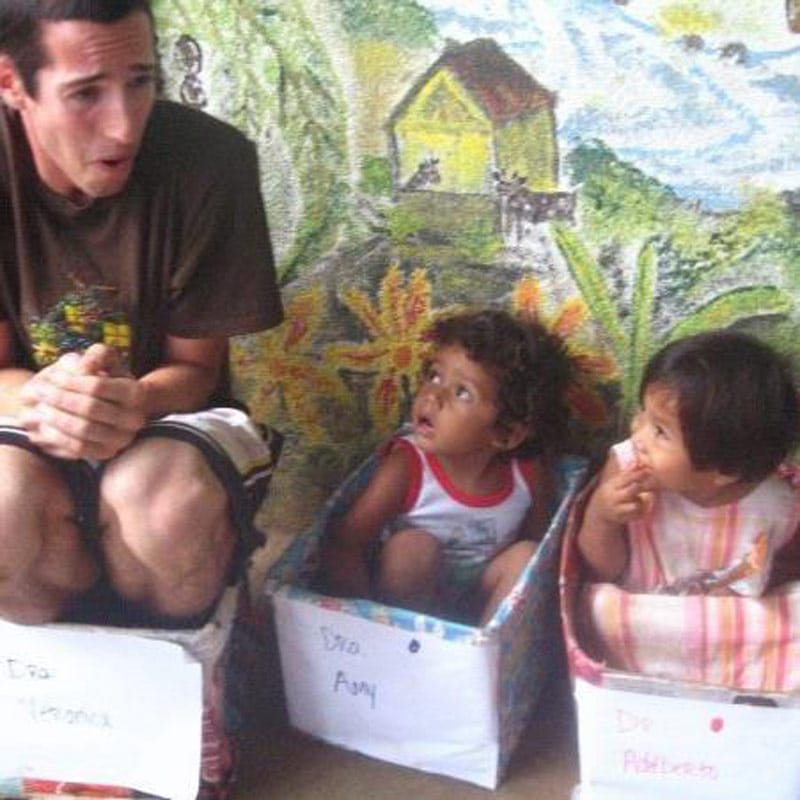
Integrating the Two Journeys
My first formal social justice education experience involved volunteering as a part of the Pangaea World Service Team in Nicaragua when I was a college student at the University of Michigan. It devastated me to learn about the leading role the US has played historically in keeping Nicaragua in poverty. I experienced what Bobbi Harro calls a “critical incident” which “creates enough cognitive dissonance that a change is initiated within the core of a person about what they believe about themselves”. Paulo Freire calls this “conscientizacao” – a transformative process from object to subject that lit my soul on fire for social justice.
Upon returning from this trip, I joined the social justice education University of Michigan’s Program on Intergroup Relations (IGR). Through social justice dialogues, I began to develop critical consciousness around identity, power, privilege, and oppression across personal, interpersonal, institutional, and systemic levels. An IGR mentor told me that there was a book, Parenting for Social Change by Teresa Graham Brett that would “blow my mind.” It completely did.
In bringing together parenting and social change, Teresa integrated her previous social justice education experience around identity and power (being a past co-director of IGR at UM) into her relationships with children. Teresa approached her relationships with children as a personal arena for practicing social justice which was integral to her pursuit of justice in the world. Her book helped me begin to see how a transformation of childhood could transform the world as I realized that there were profound lessons from the wisdom of children and childhood experiences that were invaluable for social justice education and activism.
For more than ten years I have worked with leading child and family activists from across the globe and since 2020, I have created the original concept of Swingset Activism which is currently being studied with a grounded theory approach through creative social justice education with the next generation of changemakers from across the globe. Swingset activism asks us to close our eyes and feel that exhilarating liberation you feel as a child on a swing soaring to new heights, perspective, and possibilities. Swingset Activism is a new type of activism inspired by childhood. There are many types of activism like environmental activism, relational activism, consumer activism, or design activism. Each offers a specific approach and focus lens to changemaking. Swingset Activism is activism generated by love that is integrative, relational, and imaginative. Swingset Activism brings together Ecological Systems Theory (Integrative), Relational Activism (Relational), and the Inner Child (Imaginative). It centers the significance of transforming childhood in activism as a strategy to maximize personal, social, and global transformation.
Swingset Activism brings forth a new level of awareness which catalyzed my search for my own authentic voice at the root of my passion for social justice. As I meditated on finding my inner child’s authentic voice for social justice, what came up for me is the earliest experience of being in the womb is lived experience of the profound interconnection and interdependence of human nature, and for the first few years of infancy there is no “other”. This is important to remember in pursuits of solidarity and partnership in social justice. It is our true nature. It is our original sense of inter-being that acknowledges that all of our liberation is bound together. Through the integration of these insights and practices the elasticity of my own mindset expanded of the whole world being one family and that children are, as Carol Stack would say, “all our kin”.
Understanding the wisdom of my inner child also brought back memories of having a clear, innate sense of right and wrong as a child. This recollection reminds me as an adult that the pursuit of social justice is not performative, but intuitive and relational.
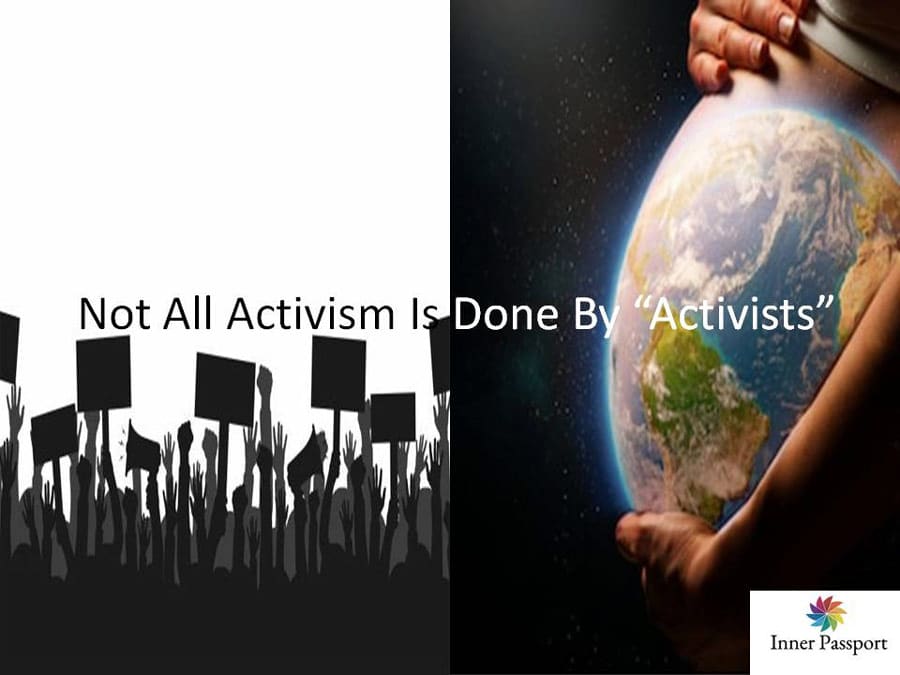
Activism as Relationship
Swingset Activism offers the insight that not all activism is done by “activists.” In their seminal academic article, “Relational Activism: Reimagining Women’s Environmental Work as Cultural Change” Sarah O’Shaugnessy and Emily Kennedy introduce the term “relational activism” for how we approach our personal and private lives that directly affect social change. Relational activism captures the behind-the-scenes, private sphere, community-building work of activism and highlights the importance of community, networks, and communication in contributing to long-term social change. Relational activism values public and private sphere actions equally while honoring the moments of social justice that happen within daily routines and in daily relations with others. For activism to be innovative and to generate a sustainable lifestyle, it needs to live within everyday moments of relationship, especially in building equal power relationships across social identity differences.
I believe that for activism to be integrated into a lifestyle it needs to relational and embrace elements of playfulness, joyfulness, loving-kindness, presence, creativity, and our capacity to re-imagine what’s possible. The process can then match the goal of social justice from integration of these valuable ways of being that children embody most regularly into activism. Audre Lorde says, “the master’s tools will never dismantle the master’s house” which calls upon our imagination and creativity in approaching social justice. I believe it acknowledges the wise contributions of children and childhood experiences in activism. It also serves as a reminder of the solidarity and sacrifice of children and youth literally being on the front lines of social justice movements throughout time, which is not credited since history is typically told by adults.
Intentionally approaching integrity in activism also requires looking critically at what I call the “activist paradox” exploring the ways in activists unconsciously recreate systems of oppression, linked to experiences of oppression in childhood within social justice efforts. Paying attention to these paradoxes will highlight the continual inner work adults need to do to heal their inner child. From reflecting on my childhood, I am able to begin a process of integration that allows me to link the change I wish to see in the world; in myself and my daily routine, ways of being, and relations with others. I have learned to view activism in a relational way that practices social justice in everyday moments, with change happening at the speed of trust, and inner and outer change being interdependent across levels.
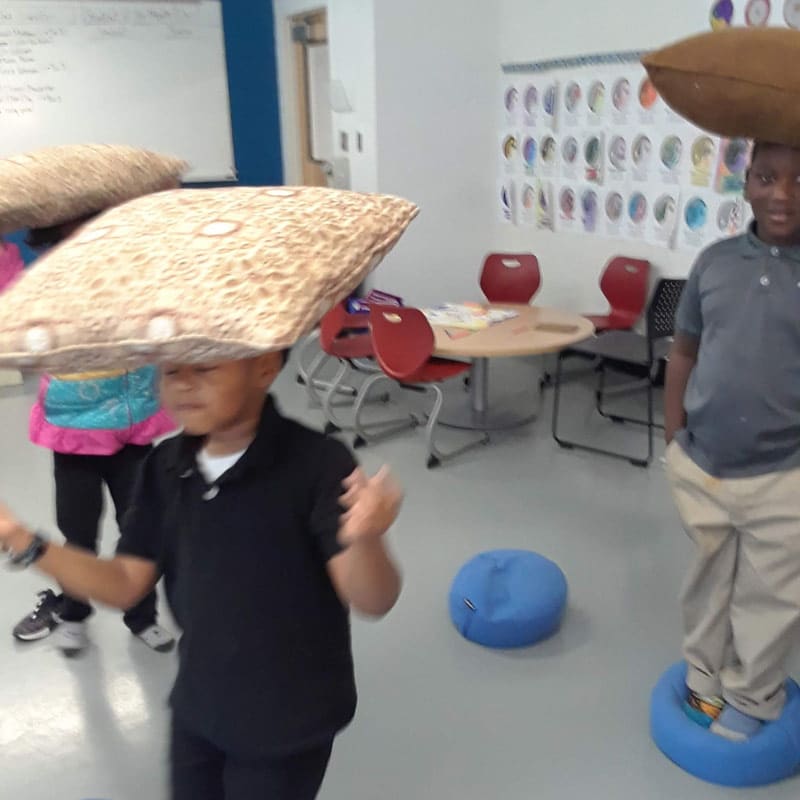
Imagining a Transformed World
As an activist, there is a desire to see clearly the roots of injustice and oppression so that efforts to create change actually transform the systems of oppression and not just the symptoms of oppression. It is known that the nature of oppression is non-hierarchical and intersectional but less known is how oppression is foundational in childhood. The wisdom of the science of relationships has revealed how our earliest relationships set a blueprint for relationships over the lifespan.
Since the oppression of children is the earliest, most normalized, and rationalized form of oppression; it provides the foundation for other forms of oppression because the first relationships in childhood root initial experiences with the common elements of oppression. These common elements of oppression are core to adultism, (the supremacy of adults over children), and underlie oppression in any form:
(1) a false notion of superiority across an identity difference becoming seen as an inherent belief that one identity group is superior to another and
(2) this belief being enforced as justification for the superior group to normalize its power and control over the other to maintain its superiority.
Adultism sets an invisible infrastructure for other socially constructed power-over divides across social identity to find deep hold, especially because children face the oppression of adultism with the least control and capacity to resist or language to make sense of the experience. Oppression then becomes internalized and normalized and the oppressed then become the oppressors, but oppression can be uprooted with the unlearning of adultism and the empowering of children, which is called childism, similar to feminism but for children.
Potentially, the most promising aspect of Swingset Activism, which focuses on social justice beginning with childhood, is that oppression is not only foundational in childhood it is notably the one oppression that all adults have common experience with – although there is difference in how adverse childhood was, everyone experiences adultism in some form during childhood. For example, despite increasing awareness of the commonality of Adverse Childhood Experiences, ACES, the overall experience of childhood involves a lack of control and domination over children by parents, teachers, and a larger institutional and societal culture of adultism. Because all adults were once children and still carry their childhoods within them, the convergence of adulthood and childhood can be comprehended in the mind and the profound interconnection of adult and inner child felt in body.
This shared experience presents an opportunity like no other for interest convergence, a concept that posits that there will only be social justice progress when it is perceived to be in the mutual interests of both the privileged and the oppressed. Unlearning adultism may provide the simplest convergence of mutual interest across a social identity power divide because it so plainly illuminates how deeply our liberation is literally bound up with one another and how adults and children are equal partners in the pursuit of social justice. Adults cannot be truly free until children are free, and until adults heal their inner child from the internalized oppression of their own childhood.
Swingset activism asks us to close our eyes and feel that exhilarating liberation you feel as a child on a swing soaring to new heights, perspective, and possibilities. As Teresa Graham Brett wisely reminded us, we can in full swing begin to “imagine a world where mistrust, power-over dynamics, domination, and oppression no longer exist because children have never experienced them.” We can begin to create a new story of childhood that creates lasting social justice and the transformation of what is possible.
If you would like to be a part of the founding of the Swingset Institute, please contact me at davemetler@gmail.com!
Sincerely,
David Charles Metler
2022 Goldin Global Fellow
Founder, Inner Passport
Volunteering: the Key to Peace in Bangsamoro

There is a strong relationship between peace building and the role of volunteerism in the promotion of social cohesion, reconciliation, civic engagement, and the development of local human capacities. Volunteerism generates forms of social capital that are indispensable to peace-building, and it plays an important role in aiding the development of citizens capacities. While every post-conflict situation is unique, volunteerism is known to help regenerate certain fractured or absent dynamics that the processes of reconstruction and reconciliation typically aim to address.
Volunteerism is embedded in the Philippines, as voluntary activities have been carried out for centuries. Bayanihan is the traditional term for volunteerism in the Philippines.
Lo Ivan Castillon, Goldin Global Fellow

The term "bayanihan" relates to ancient traditions of values and is frequently associated with voluntary cooperation, such as when community members help one another move homes.
In the southern part of the Philippines, in the Bangsamoro region, volunteering has a significant role in sustaining the gains of the peace process. Volunteering is manifested in active citizenship in the Bangsamoro Youth Transition Priority Agenda (BYTPA) of the Bangsamoro Youth Commission (BYC). It includes active participation in the creation and appreciation of Filipino arts and culture as well as active volunteerism in youth-focused groups, networks, and other community organizations. Volunteering among diverse youth groups, especially in planning and decision-making for relevant programs conducted by youth-serving ministries and agencies, NGOs, and local government units (LGUs), can help to achieve regional and national peace. All youth are encouraged to share their unique culture, arts, and crafts in order to foster deeper connections and harmony among the different young populations in the region.

This sharing will also help preserve the various subculture’s diverse and amazing customs and arts. Volunteerism that exhibits social awareness and socio-civic consciousness, as well as the formation of values such as compassion for others and social responsibility, are all strategies to achieve active citizenship in community development and nation-building. To achieve this, Bangsamoro Youth Commission strengthens enabling mechanisms like policies and programs that support youth organizations and participation; engages youth in the preservation, protection, development, and promotion of Bangsamoro culture and arts; instils volunteerism through academic and community engagement; and fosters social awareness and responsibility in youth. Active citizenship in this aspect develops strategies to increase the number of youth volunteers in order to facilitate, diversify, and sustain youth volunteerism in the Bangsamoro region.

The Bangsamoro youth defined volunteerism as an interest, a willingness to serve, a passion, a commitment, a selfless act. The youth volunteers commit to being active citizens in promoting BYC's transition agenda based on moral governance, with a focus on utilizing knowledge, strengths, skills, and other resources to promote youth issues in relation to peace and development, and in rendering services without expecting anything in return.

Volunteerism is critical for the Bangsamoro youth because it serves as a reinforcement to the government's efforts and serves as a link between the regional and local governments and the community. Likewise, young people initiate research and data collection in order to express the public's demands and interests. On the other hand, Bangsamoro Autonomous Region in Muslim Mindanao (BARMM) institutions support youth volunteers by providing opportunities for knowledge sharing about health issues and establishing social enterprises for them. Scholarships for Bangsamoro youth and linkages to other organizations may be some of the services provided by the BARMM ministry. Furthermore, the stability of peace and order in some areas of the region must be prioritized to ensure safety, and young people must benefit from peace gains, especially in conflict-affected areas.
In places affected by violence, youth and youth organizations operate in schools or madaris, local communities, and other institutions such as churches and mosques. They focus on offering opportunities for volunteers and young people to engage in social responsibility and become agents of positive social transformation, peace, and sustainable development. Throughout the COVID-19 pandemic, various youth organizations developed projects to aid government and non-government organizations in the fight against the virus. This included hosting online conversations, promoting youth stories, projects, and home quarantine activities which provided psychosocial and peer support to youth during a period where there was a lot of uncertainty, worry, and daily changes.

Like other youth serving organizations in the Bangsamoro, Volunteers’ Initiatives in Bridging and Empowering Society (VIBES), an organization for which I am Founder, started from local youth volunteer outreach activities in Cotabato City and surrounding regions. Following the positive responses, we formed a space called the volunteers hub which allowed volunteers to participate in initiatives that "give back" to the communities. In VIBES, we believe that in everything we do, peacebuilding is our ultimate goal. We believe that all advocacy efforts, whether offline or online, in the areas of empowerment, the environment, and education, among others, contribute to the peaceful and sustainable development of our local communities. Whatever path we take, our goal is to provide avenues for youth advocacy and a chance to bring their visions to life.

In VIBES, we practice the Cycle of VIBES Volunteer Service as a framework of our operation, such as Identification of Volunteer Opportunities, Asset Mapping, Recruitment or Pool of Volunteers, Orientation and Capacity Building, Deployment & Immersion, and Documentation, Monitoring, and Evaluation.

In this endeavor, the whys of volunteering include valuable experience, increasing self-esteem, avenues for awareness and voice, social status, and spaces for social networking. In all of our initiatives, we involve various stakeholders as well as connectors. We make sure to understand the context of the community we serve, practice the Do No Harm principle, map the assets, and address their needs. Cultural sensitivity and a safe approach are significant. That is why speeches, words, and terms matter. We continue to explore and welcome innovative approaches, especially as we are dealing with young Bangsamoro.

Volunteers play a crucial role as enablers and multipliers in shaping the Bangsamoro youth as proactive agents of peace, development, and social transformation. The youth advocate moral governance as the guiding principle for all development programs. It stems from the willingness of the youth volunteer to serve in accordance with God's will. In full support of the whole-society approach, the idea of inclusion is implemented in order to promote a safe, non-discriminatory environment. It promotes respect for ethnic, gender, religious, and cultural diversity. The efforts and contributions of the youth volunteers introduce developments to the existing public and private sector systems and mechanisms. In the volunteers' continuous pursuit of social transformation, they serve as a key to sustaining the gains of the peace process in the Bangsamoro region and an extension of the development partners by maintaining the latter's ideals and aspirations in relation to the Bangsamoro's principles and vision.
Crescent Collective Calls for Religious Freedom and Understanding
By Yusuph Masanja, Co-Facilitator, Global Alumni Network
Goldin Global Fellow Mahdar Tahir from Malaysia and founder of the Crescent Collective contributed as a panelist to an online discussion and celebration about Religious Freedom. This online event brought together contributors from India, Sri Lanka, Philippines, and Malaysia to share wisdom and knowledge about how religious freedom promotes social harmony. The event was hosted on 28 April 2022 by American corners and was moderated by William Robertson, the U.S. Consulate General in Hyderabad, India.

At Crescent Collective, Mahdar works to guide Malaysian youth towards spiritual awareness and understanding by grounding moral values through talks, community projects, and volunteerism on arts and culture. Right after his participation in the Celebrating Religious Freedom event, I requested a brief interview with Mahdar to discuss his insights on the topic. We discussed tolerance, the role of religious leaders, and the problem of misunderstanding other people.

We started talking about tolerance where Mahdar argued for a more proactive approach in promoting freedom and harmony.
We must move beyond tolerance. I believe it is everybody’s duty to seek to understand others. We no longer live in villages without seeing other people. The world is global, and it is our job to promote understanding of different people and cultures. Even the Quran has a commandment about understanding each other. We would not need to know each other if we were the same!

In the face of today’s ongoing conflicts, Mahdar highlights the role of religious leaders in promoting peace. Their influence from spiritual teachings is a powerful force for Peace because they can speak to the hearts of people.
“It is not about the mind, it is about the heart. How do you understand others and begin to appreciate them if you do not even understand yourself?

He insisted that religious leaders must teach the core ethical values of understanding one another. That way we can effectively advance social harmony. In Mahdar’s perspective, failing to understand each other is evil, and the best way out of that is through complementing each other.

In this brief phone interview, Mahdar summed up his thoughts by reminding us that religion is a very powerful tool which can be used for good or for bad. And that the lack of understanding one’s own religious values is often a source of conflict.
Lack of religious freedom does not imply different religions fight against each other, but rather a tendency where certain individuals with evil motives use religions to divide people, exacerbate conflicts, and therefore limit freedom.
In a different but relevant update, this year’s Ramadan saw Mahdar working single handedly to collect food from Ramadan food bazaar and distribute it to those who needed it most. He sought to understand how the problem of food wastage during Ramadan could be solved. After walking and talking with community members to understand their concerns, he quickly took it up for himself to organize food that could otherwise be trashed as excess by vendors and delivered it to people who appreciated it!

He saw the value in understanding the predicament of local businesses in Malaysia with regards to freely distributing the food themselves which helped him realize a simple yet effective solution. His endeavor during this year’s Ramadhan reduced food wastage, created awareness and reminded everyone that the spirit of Ramadhan is to reduce consumption rather than increase them. “Reduced consumption will lead to zero waste.”
Building a Brighter Future for Survivor Entrepreneurs at Shyne
By Cynthia Luvlee, Goldin Global Fellow, President and Chief Visionary Officer, SHYNE SD
Shyne is growing exponentially this year! We started 2022 with 8 survivors on the Shyne Survivor Business Network™ and we are delighted to announce that a few weeks ago we enrolled our 50th survivor entrepreneur and launched our new website www.shynesd.org!
When I began Shyne in 2018, following completion of the Goldin Global Fellows Program, our funding was so limited; I didn’t know we were going to be able to grow and accomplish the Shyne mission of supporting survivors of human trafficking through professional development services and encouraging a community of survivors towards economic independence and entrepreneurship.
Getting to this point has not been easy. Even with our great team and successful graduates, it took funders a long time to understand and counteract the stigma placed on survivors of human trafficking, and fully see the innovative power of believing in them as entrepreneurs.
The approaches I learned as a Goldin Global Fellow have been instrumental to me in my journey with Shyne, especially the commitment to center the voices, insights, talents and assets of those directly impacted by human trafficking. As we have grown, we are happy to share three principles that continue to guide our work and facilitate our growth.

1. Really Listen to the Community You Serve
At Shyne, 93% of those we serve were involved in commercial sexual exploitation and the other 7% identify as survivors of domestic violence and labor trafficking. We are working with individuals who have come out of the sex industry, who were often lured into the sex trade for financial reasons and became trapped in it.
To recognize the importance of listening, we asked the 50 survivors in our network to complete a strengths assessment to better understand their inherent strengths, which would have been learned by confronting vulnerabilities and traumas from their trafficking experience, an area where data is severely lacking.
In addition, we are working in conjunction with other programs to provide survivors with employment or education, depending on what path they chose and what they need to advance their career. Some of the top strengths of survivors we have identified are social intelligence, perseverance, creativity, and their ability to put themselves in somebody else's shoes. They also have strong leadership skills and are risk takers, the kinds of things I look for in an entrepreneur.
Findings from the strengths assessment will be quantified by a data specialist outside of Shyne, to enrich the final report, and will be ready to be launched by the end of the year.
At Shyne, we focus on driving a solution to best support survivors because we truly believe in them. We consider they are fully capable of actualizing their dreams so that is where we start. That way we trust in building a brighter future for them, providing support, education, connections, and mentorship. From the survivors' perspective, they deeply desire a sense of belonging, a sense of community, a sense of being uplifted or having their cup filled. Indeed, they really do know what they need, and they really are quite adept at creating the solution.

2. Focus on What’s Working
We have been a part of the “Tech2Empower Program” that helped us to broaden our reach with developing Salesforce tools for our new business coaches. In the past I had been the only one providing coaching and so with the new business coaches, we created a Salesforce form that helps us to qualify our key performance indicators. It has been helpful to see the investment that Shyne has made into each survivors’ start-up during the year; an estimated $5,000 of pro-bono coaching and training is provided to each entrepreneur during our nine-month signature incubator.
Shyne recently hired its first program director, Kayla Bright, who herself is a survivor of human trafficking; building a network of survivors who have their own business and collaborate together is a key piece of her vision. Bringing Kayla on board will help to achieve our mission of supporting survivors’ economic independence, and having a survivor as our first program director is just a dream come true. Kayla also collaborates at Survivors Ventures in Virginia (survivorventures.org). Survivor Ventures is an incredible agency who cover a portion of the cost of that employee so that we can leverage time we need to grow our business and fill a new full-time position. We have also continued to partner with Varonis Systems. They are corporate sponsors who provide us direct funds as well as facilitators for our “Incubator” workshops. That corporation has directly connected with survivors in a very impactful way, helping to shift the stigma of lack of trust in the impact community. We also partnered this year with Victoria Washington, a wealth coach who is now guiding us on how wealth is generated, a key component to healing for survivors of sex trafficking.
The Survivor Business Network™ collaborate and partner with each other with their time, expertise, and perhaps complimentary power partners. We help to facilitate their connections through a survivor led networking group so that they can learn one another's businesses and be healthy referrals. Thereby, several innovative solutions were created in non-profits, for-profits, and social enterprises. Most inspiring is when Rachel Thomas, who is a nationally known survivor, called Shyne as she was looking to hire someone for her team and asked for a potential employee within our network who would be a good match. Of course, we were glad to recommend someone and make the connection! That individual got hired into a survivor-owned business. In essence, we envision a network of survivor owned businesses hiring each other, supporting each other's sales of goods and services, and investing in one another through mentorship and coaching.
We continue to collaborate with leaders in the community. Survivor Ventures, which places the survivors into employment opportunities, Empower Her Network (empowerhernetwork.org), which provides wrap-around support through empowerment plans and The Avery Center, a survivor-led multi-faceted research and direct service agency. All have been incredible referral sources for us as a lot of their participants want to start their own businesses. Empower Her Network provides an 18-month empowerment plan so survivors can mitigate some housing instability issues like building a savings account, or getting help to finance certifications, or even support an educational initiative which someone might need to get their license as a business owner. We also partner with The Avery Center, founded by Megan Lundstrom, who also wrote The Survivor's Guide to Money(theaverycenter.org). They all are leading the employment portion for survivors, meaning that they are eager to put together recommendations to employers on being inclusive with them and their application process, as well as assisting with preparing people to apply for jobs and careers within their desired career paths. Shyne sits at this interesting intersection with economic equity as its core mission.

3. Share the Table
I was invited to participate in the Uncharted Economic Inequity Co-Lab this year. It ran for 8 weeks and involved hearing lots of different approaches to economic equity and removing barriers to financial wealth. Shyne’s model is, I think, different and unique. As a result, we are building our own system as we invest directly into survivor's solutions. We know we do not have the solution; everyone can provide a unique approach to work with individuals who have come out of the commercial sex trade and that can even vary from gender identity to wealth identity to racial identity. That way we are shifting the stigma and showing the world, and essentially investors, bankers and community members, how capable and resilient survivors are.

The Road Ahead
We are grateful to now be engaging with leading banking institutions that are in partnership with the United Nations Finances Against Slavery and Trafficking Survivor Inclusion Initiative, to talk about credit repair, survivor businesses and banking solutions to help create access to products and services. Thus, with this “incubator”, Shyne has brought formation of new business entities, and we are very well positioned to work with lending institutions and banks, not only to repair credit through business loans but to open business banking accounts and start to foster those relationships with financial institutions. It is a fact that survivors can sometimes feel misinformed and uneducated, even excluded from those products and services due to their trafficked experience. Perhaps they have suffered financial abuse from their trafficker, or they were placed in a position that resulted in poor credit. It means they become sort of the unbanked.
Therefore, Shyne is providing new pathways through business for survivors to be engaged in understanding budgets, repairing their credit, having a healthy relationship with a bank, being able to access money while working with financial institutions, and to begin preparing their savings account to be able to become owners of homes and cars.
Finally, last month we celebrated the formation of three new businesses through this “incubator”. We have twenty people enrolled currently in the program this year and I expect many of them to be pitching their businesses to investors in November 2022. In that sense, we really want to ask our community to support and help us with growing the Survivor Start Up Fund. We allocate 100% of those funds to support survivor start-ups.
SUPPORT SHYNE
Grassroots Perspectives on Liberia’s Health, Sanitation and Justice Issues
By John Kamma, Goldin Global Fellow, Liberia
Catalyst 2030 is a global movement of social change innovators. Members include NGOs, social enterprises, intermediaries, funders and other social change innovators collaborating with urgency to achieve the Sustainable Development Goals (SDGs). Catalyzing Change Week was organized by C2030 as a dedicated annual week of in-person and online gathering on May 9-13 2022 involving people and institutions addressing the world’s most pressing problems of inequality, poverty, disease and injustice.
From the strength of its diverse orientations and backgrounds, people and institutions with Catalyst 2030, are determined to work collaboratively for the attainment of the SDGs. As members of Catalyst 2030 Liberia, we successfully and officially organized the launch on May 11, 2022 with social entrepreneurs and others in attendance.

In addition to the Liberia’s Chapter launch, it was an honor to organize two successful sessions, namely, “Community mobilization to improve sanitation and Health” on May 10, 2022 and “Looking forward to narrowing the justice gap” on May 13, 2022 with support from Catalyst 2030 Liberia chapter members and others.
Arranged chronologically beginning with May 10, where I presented how a low income community called Glass Factory in Liberia got mobilized through community conversation around assets mapping, Appreciative Inquiry and community visioning summit. Uncovering talents and resources available to them, the community took action to improve sanitation and health hazard post from inappropriate use of drainages and the lack of public latrine.
Residents of Glass Factory established their priorities which helped to shed light on available resources each one has to contribute including wheel barrow, ricks, booths, brooms and gloves. They then worked together to remove plastic bags from drainages which clogged up the sewage. Together, we made a direct improvement to our community by installing a new toilet facility with a functioning sewer system.

By taking direct action together where we build on the assets and skills of our neighbors, we can improve health, sanitiation and justice in Liberia!
The session keynote speaker, Dr. Angela Benson indicated that to holistically improve community Sanitation and Health we require a multi-sectoral approach.
Community health is improved with provision of clean and safe drinking water, when everyone agrees to wash hands, having toilet facilities,adherence to public health regulations in cases of disease outbreak and improving agriculture to nourish people with nutritious foods. . Local community dwellers need the support of partners such as the government and the public sector in situations where community health and wellbeing are threatened.
In the Glass factory community, we worked with those who are mostly affected by social challenges. During the course of my Goldin Global Fellows program, they shared local knowledge about key aspirations and priorities shared by the broad community. We then examined available talents and resources that we later on tapped to realize the clean up campaign and building a toilet facility as a consequence. Speaking on challenges to improve community health and sanitation, 2021 Mandela Washington Fellow and Executive Director of the Potential Leaders for Sustainable Future (PLSF), Miss Janet Ricks indicated that many challenges faced by communities border around lack of proper education about the risk associated with the poor hygiene practices that could possibly lead to diarrheal and other water borne diseases.
Liberia is a country with abundant rivers, rain forest, mangroves and swamps. It is one of the world’s wettest countries in the world but statistics show lack of infrastructure and services to reach everyone with safe drinking water. In 2017 research conducted by UNICEF showed that 10% of Liberians have access to safely managed drinking water and sanitation service. 42% of Liberia population practice open defecation according to the Joining Monitoring Programmed report in 2017.

Different Nongovernmental and governmental organizations face challenges in achieving high levels of hygiene in communities. Challenges to improving sanitation and health care includes: Poverty, lack of political commitment, inadequate political gender inclusion, lack of coordination amongst state actors, behavioral issues and inadequate awareness. In order to improve the situation, Janet remarked “We need empowerment, pushing for equitable access to hygiene needs, increasing advocacies for political commitment, gender equality and youth involvement at community level.”
On May 11, 2022, another fascinating keynote address was delivered by the founder of world toilet, Mr. Jack Sim, at the launch of Catalyst 2030 Liberia. Mr. Sim shared inspiring insights about efforts undertaken in his home country (Singapore), to advance from a third world nation to a first world nation and how other governments learned from them in an attempt to improve the living condition of their citizenry, with reference to China and Rwanda in Africa.
Mr. Sim encouraged Liberia to learn from Singapore’s examples,reduce dependency on aid, seek investment opportunities, expand employment among citizens, and eradicate corruption through transparency and political good will.He stressed the importance of paying public officials well, holding corrupt officials accountable to the rule of law, and always having a possibility mindset in what we envision to achieve.

At the launch of the Catalyst 2030 Liberia, chapter members served as panelists to the discussion titled, “Taking Liberia to the next level of system change for attainment of the SDGs.” During the presentation, I underscored Collaboration, Commitment, Transparency and Accountability as key components to consider as indicated below:
- Collaboration seeks to complement and enhance capacity to effectively solve social challenges for sustainable solutions when involving others, especially those affected. It promotes seeing the system holistically as opposed to seeing it from a single lens. As social problems are experienced by people, including them in devising a solution to maximize impact, promote sustainability and ownership; when people take ownership of the process and the solution they are able to protect, care and sustain the outcome of their efforts.
- Commitment enhances system change through trust building. When committed to change a mindset is developed that binds an individual to a course of action deemed necessary for the successful implementation of the change initiative. It increases performance and the ability to meet goals.. When an organization, for example, is committed to its employees by ensuring job safety, awards for excellence or good performance, employees will feel more connected to the organization and become more productive and dedicated to their work. Commitment to a cause for social good no matter how long it takes in realizing that social good, once it is done people's lives are affected positively. It is possible that a small dedicated group of citizens, when committed to a cause, can realize the change they desire for the benefit of a nation or world.
- Transparency, the fight against corruption must be intensified by ensuring a fast strike court which prosecutescorrupt officials and serves as a deterrent to others who might intend to initiate corruption. Liberia is a rich country with abundant resources in timber, gold, diamond and ore amongst others, with a small population of over 5 million inhabitants. The country is rich in natural resources yet most of its people are living below the poverty line. To take Liberia to the next level of system change, we need the political will to force corrupt officials to bear the full weight of the law. The government of Liberia must develop policies to protect advocates who expose corrupt practices, to pay public servants a living wage that discourage corruption temptations. in line with that, the common Liberians expression, “where you tie the goat, there the goat will eat”, has to be discouraged. he goat should only eat what belongs to it.
- Accountability is parallel to trust building, commitment and transparency clearly underscoring its significance to be employed as a tool for system change. Being accountable enhances a donor's confidence, trust and commitment in an individual or institution. Holding our leaders and public officials accountable to the rule of law will result in exposing bad governance, and ensuring the right people are given the opportunity to serve in public spaces.

On May 13, we presented on the topic, “looking forward to narrowing the justice gap”, at which time Citizen Bureau for Development and Productivity was said to have being developed from the restructuring and reforming of the new Liberia National Police 2009 as a nonprofit and non-political Civil Society and humanitarian organization seeking to advance the rule of law, promote civil justice, improve citizens police relations and eradicate poverty in Liberia through Community Justice Initiatives. As Founder and Executive Director of theCitizen Bureau, it was my pleasure to organize this session and the previous one on“Community mobilization to improve Sanitation and Health”.
The Citizen Bureau collaborates with Civil Society Organizations and members of the formal legal system to bridge the justice gap through its Community Justice Teams by working in low income communities so everyone despite background or station in life has access to redress grievances void of violence. When citizens face legal challenges in Liberia, the lack of legitimacy, affordability, accessibility and timeliness of the formal justice system often prevent any feasible recourse. Extensive bureaucratic red tape coupled with transportation and legal costs, lawyer’s fees and opportunity cost of foregone work, makes the justice system not only physically but also financially unavailable to many.
Against this backdrop, we are promoting Alternative Dispute Resolution methods to peacefully dialogue over conflict emanating from the community, ensuring community resolution in instances of civil or misdemeanor disputes. In doing so, we underpin the formal justice system by building local capacity to resolve disputes between conflicting parties in a manner deemed satisfactory to the parties in a country where most people cannot afford the formal justice system to redress grievances.
In the UNDP/UNMIL strengthening the rule of law project documents, even before the civil war, the formal justice system was perennially weak. In a 64 page report published by Human Rights Watch, “No money, no justice: Police corruption and abuse in Liberia,” describes the multiple criminal activities of corrupt police officers, from charging crime victims for every stage of an investigation to extort goods from street vendors. Similar accusations are also attributed to the courts and that has greatly undermined any sense that wrongdoing will be punished. It has hollowed out trust in public processes more broadly. In very low income highly dense urban settings, disputes are frequent and other traditional justice mechanisms which still endure in rural areas are often absent because of the more transient, multi ethnic, multi linguistic nature of communities.
Our solution to buttress government efforts in promoting justice and maintaining peaceful coexistence within communities is supporting Community Justice Teams (CJT) at the local level in insecure areas of Monrovia, Kakata and Gbarnga. Through the robust community awareness, community dwellers are familiar with the mediators and the process of the CJTs that is proven to be a key driver for peace and community co-existence. This is reflected by the over 800 resolved community disputes at the four mediation centers as of 2018 to date. In conversation with a beneficiary of the CJTs project, he noted:
“I do not go to the police or the courts since they charge me money illegally-but this mediation center was established in my community and it’s free.”
By resolving disputes before they reach the courts, and working with the local police to feed cases back down to the CJTs, the mediators are also reducing the burden off the formal justice system. Criminal cases brought before the mediators are referred to the police and then followed up on by the mediators to ensure they receive the attention they deserve through the formal justice system. The CJTs project is building sustainable capacity amongst communities to mediate and solve disputes over time by training the mediators in mediation and legal issues. This knowledge and these skills endure well beyond the period of a grant, and can be transferred to new volunteer mediators over time. With this approach, violence against women by their male counterparts is reduced, as communities appreciate the tools created, it changes violence attitude and thinking of people toward seeking a more peaceful, fair and justifiable approach to resolve disputes through the CJT. It promotes community harmony and consciousness between citizens as opposed to the lack thereof. We envisaged that the outcome of this work is an informed community of Liberian citizens at the local level who can solve legal disputes, raise awareness of justice issues and build trust within urban, poor and insecure communities.
The keynote speaker, W. Lawrence Yealue II, expressed the need for the Liberian judicial system to adopt the paralegal practice in support for mediators in Liberia. He further stated that the challenge with the security sector reform is that personnel don’t see themselves as service deliverers as the use of force by security forces is never proportional. He emphasized that the justice system must have respect for democratic inclusion in dealing with problems related to the justice system which is deeply rooted from the formation of the Liberian nation state in order to close the justice gap. He acknowledged the methodology of the Citizen Bureau through the Community Justice Teams, working with trusted and respectable communities dwellers on the ground is important to narrowing the justice gap, trust building which underpin the rule of law in Liberia.
Several mediators in attendance spoke passionately about their work as they collaborate with the formal justice system and community leaders to resolve cases emanating from the community without any instance of recidivism. Those impacted by the resolution of cases resolved, were saved the money and time they usually have to pay going through the formal justice system.
Promoting Peace Through the Arts in Mombasa
By Nicholas Songora Odoll, 2021 Goldin Global Fellow, Kenya
Manyatta Youth Entertainment (MAYE) is a community based organization active in the coastal counties of Kenya, which uses arts, sports and media to promote social change. Our team is led by youth for the youth and we are grounded in human rights principles. We have been involved in the areas of social accountability, civic education, and social justice using creative arts, innovation, and technology as a mode of communication while providing alternative livelihood and economic empowerment to young men and women. We are also active in addressing concerns revolving around gender-based violence, violent extremism, and armed juvenile crime.

In the first quarter of the year 2022, our team at Manyatta Youth Entertainment focused on expanding collaborations with like-minded organizations, strengthening our center’s library and capacitating our team. In February 2022, we hosted a delegation of development partners led by the Global Community Engagement and Resilience Fund-GCERF, Act Kenya, and the Coast Interfaith Council of Clerics Trust-CICC. Partners learned about our work and participated in the ongoing entertainment and dialogue activities which were happening at the center. In March, a team from Segal Family Foundation (SFF) visited us to learn about our programs and see the youth friendly space (Anika Community Hub). This month, April 2022, we were honored by a visit from the Ministry of Interior led by the Regional, County, and the Deputy county Commissioners. Along with this delegation, we got the chance to join meetings with the Kenya ports authority officials in discussions about the Dongo Kundu area free economic zone.

Our team learned as much as the visitors learned from us, it was an equal exchange of knowledge, experiences, and ideas for possible collaborations. We are grateful for these connection opportunities and are committed to partnerships in building peace. Our team continues to look forward to forming a sustainable working relationship with other like-minded organizations.

In March one of our partners, the United Nations Food and Agriculture Organization (UNFAO), donated books to Anika Community Hub. The support furnished our small library with a whole new variety of readings for our youth. Our library fulfills the commitment to article 35 of our national constitution on the right to access of information. Young men and women can now visit our center to learn and grow from the wisdom contained in the books found at our library. In the same month, we organized a 3-day training on Human-Centered Design with the support from the Aga Khan Foundation. The training involved young mentors and grassroot facilitators who work with us and the Likoni Community Development Programme - Licodep who form part of our CSOs network members. After the training, youth involved worked closely with children (10 to 16 years), their teachers and parents in designing a solution for identified problems that affect students' academic performances.

Lastly, as our country is gearing up towards the national elections next year, we joined hands with all the Civil Society Organizations along the coast to lead the process of issuing a joint press statement over the emerging insecurity concerns ahead of the elections. Joined by the network members, I issued the press statement on 7th April at Uhuru Gardens in Mombasa. You can read the full statement and/or watch us reading the statement through our YouTube Channel.
As this quarter closes, we are excited about the work and new collaborations we are going to realize in the next quarter of the year. We sincerely appreciate the support of ForumCiv Hub Eastern & Southern Africa, Embassy of Sweden in Nairobi, Coast Interfaith Council of Clerics Trust Global Community Engagement and Resilience Fund, Accountability Lab, and the Goldin Institute for the technical support that has in one way or another seen the space sustainable and open to young people.
